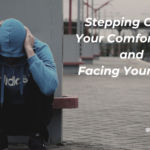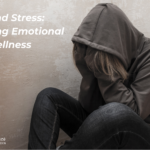Introduction
Are you feeling overwhelmed, stressed, or anxious? Transforming anxiety is not difficult. You’re not alone. Anxiety affects millions of people worldwide, turning daily tasks into monumental challenges. While a little anxiety can be beneficial, chronic anxiety can be debilitating, interfering with daily life, sleep, and even relationships. This article explores practical techniques for transforming anxiety and reclaiming inner peace.
When I studied for my MSc in Psychology, I researched the psychological impacts of anxiety on behaviour. One case study involved a woman who had tried countless methods to manage her anxiety, but nothing seemed to work. This resonated with me deeply because it mirrored the struggles of many women I knew. This highlighted the need for more effective, compassionate approaches to anxiety management. Understanding anxiety’s psychological roots is crucial to developing strategies that truly help you regain control of your life. Ignoring these underlying issues won’t lead to lasting solutions. Instead, addressing the psychological aspects of stress is key to effective management.
Understanding and Transforming Anxiety
What Is Anxiety, and how can Transforming Anxiety help?
Anxiety is a natural stress response, manifesting as feelings of apprehension or fear about future events. While it can be a helpful motivator, chronic anxiety disrupts daily life, leading to constant worry and physical symptoms like insomnia, digestive issues, and muscle tension. Anxiety can feel overwhelming when you are trying something new and feel that fear of failure rising. It can be debilitating and you may feel unable to move.
The Impact of Anxiety on Your Life
Chronic anxiety takes a toll on both mental and physical health. It can cause sleep disturbances, weaken the immune system, and lead to persistent overthinking and depression. Recognising these impacts is crucial to addressing and managing anxiety effectively. Long-term effects can impact your physical health, too.
Practical Techniques to Transforming Anxiety
- Mindfulness Meditation
Mindfulness meditation involves focusing on the present moment without judgment, breaking the cycle of negative thoughts and reducing anxiety.
- Start with Your Breath: Focus on your breathing, noticing the sensation of air entering and leaving your body. If your mind starts to wander, bring it back to your breadth.
- Progressive Muscle Relaxation: Tense and release each muscle group, starting from your toes and moving up to your head.
- Guided Meditation Apps: Use apps like Headspace or Calm for guided sessions to help you get started.
- Cognitive Behavioural Techniques (CBT)
CBT is an effective method for managing anxiety by altering negative thought patterns.
- Identify Negative Thoughts: Write down your negative thoughts and identify recurring patterns.
- Challenge These Thoughts: Question the evidence for and against these thoughts. Are they based on facts or assumptions?
- Replace with Positive Thoughts: Find balanced, positive thoughts to replace the negative ones.
- Physical Exercise
Exercise is a natural anxiety reliever, releasing endorphins that act as natural painkillers and mood elevators.
- Daily Walks: Even a 30-minute walk can significantly reduce anxiety.
- Yoga: Combines physical movement with mindfulness for a double benefit.
- High-Intensity Interval Training (HIIT): HIIT can be highly effective for a more vigorous workout.
- Breathing Exercises
Deep breathing exercises help activate your body’s relaxation response.
- 4-7-8 Breathing: Inhale for 4 seconds, hold for 7 seconds, exhale for 8 seconds. Repeat until you feel calmer.
- Box Breathing: Inhale for 4 seconds, hold for 4 seconds, exhale for 4 seconds, hold for 4 seconds. Repeat.
- Journaling
Writing down your thoughts and feelings can be incredibly therapeutic.
- Gratitude Journaling: Write down three things you’re grateful for each day.
- Expressive Writing: Write about your anxieties and stressors to process emotions and gain perspective.
- Social Support
Talking about your anxieties with a trusted friend or family member can provide relief and insight.
- Share Your Feelings: Don’t bottle up your emotions. Sharing can help you feel less alone.
- Join Support Groups: Support groups connect you with others who understand your experiences, whether online or in-person.
- Professional Help to transforming anxiety
Seeking professional help is sometimes the best course of action for severe anxiety.
- Therapy: Cognitive-behavioural therapy (CBT) and other forms of therapy can be very effective.
- Medication: In some cases, medication may be necessary. Consult with a healthcare provider to explore this option.
Conclusion
Transforming anxiety into a manageable part of your life is entirely possible with the right techniques and support. Incorporating mindfulness, exercise, breathing exercises, journaling, and social support into your daily routine can help you reclaim your inner peace. If self-help techniques aren’t enough, seeking professional help is always viable. Take the first step today towards a calmer, more peaceful life.
FAQs
- How long does it take to see results from mindfulness meditation?
Results vary, but many people notice a reduction in anxiety after a few weeks of consistent practice. The key to mindfulness meditation is consistency. Initially, you might find it challenging to focus or notice significant changes. However, with regular practice, even if just for 5-10 minutes a day, you can start experiencing a sense of calm and a decrease in anxiety levels. Remember, mindfulness is a skill that improves over time, so be patient and persistent.
- Can exercise really help reduce anxiety?
Yes, regular physical activity can significantly reduce anxiety by releasing endorphins and improving overall mood. Endorphins are natural mood lifters that can help combat stress and anxiety. Additionally, exercise can serve as a distraction, allowing you to break the cycle of negative thoughts that feed anxiety. Whether it’s a daily walk, a yoga session, or more intense workouts like HIIT, incorporating exercise into your routine can help you manage anxiety more effectively.
- What if I don’t have time for long meditation sessions?
Even short, 5-minute mindfulness exercises can be beneficial. Consistency is more important than duration. It’s a common misconception that you need long meditation sessions to see benefits. In reality, integrating short mindfulness practices into your daily routine can make a significant difference. For example, you can practice mindful breathing while waiting in line, or take a few moments to focus on your breath before starting your day. These small, regular practices can accumulate to create a more mindful and less anxious lifestyle.
- How do I know if I need the professional help of a Stress Coach?
If anxiety interferes with your daily life and is hard to manage with self-help techniques, it may be time to seek professional assistance. Signs that you might need professional help include persistent feelings of worry or fear, difficulty concentrating, physical symptoms like unexplained aches or pains, and avoiding situations that cause anxiety. A mental health professional can provide tailored strategies and treatments, such as cognitive-behavioural therapy (CBT), Stress Coach & Therapist, to help you manage your anxiety more effectively.
- Are there any natural supplements that can help with anxiety?
Some natural supplements, like chamomile, valerian root, and omega-3 fatty acids, have been shown to help reduce anxiety. Chamomile is known for its calming effects, valerian root can aid in sleep and reduce anxiety, and omega-3 fatty acids have been linked to improved mood and reduced anxiety. However, it’s crucial to consult with a healthcare provider before starting any new supplement to ensure it’s safe for you and won’t interact with other medications you may be taking. Supplements can be a helpful addition to your anxiety management plan, but they should be used as part of a comprehensive approach that includes other strategies like mindfulness and exercise.
Take control of your anxiety today by integrating these practical techniques into your life. If you need further assistance, reach out to a professional for support. Remember, you deserve to live a life free from the constraints of anxiety. For personal guidance, consider the Stress Coach London ‘From Stress to Success’ program, tailored to help you achieve lasting peace and resilience. Take your Scorecard quiz to find out what your stress levels are.










